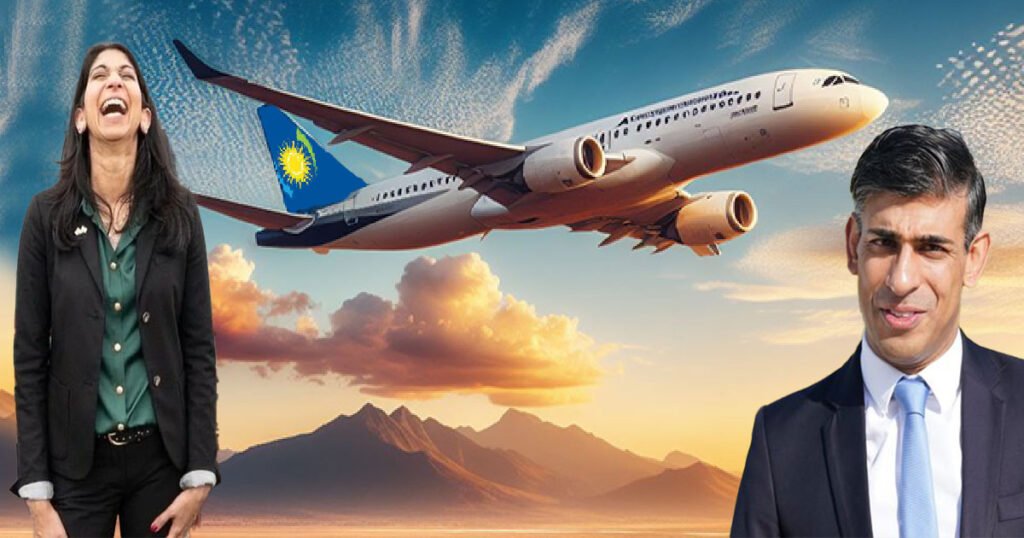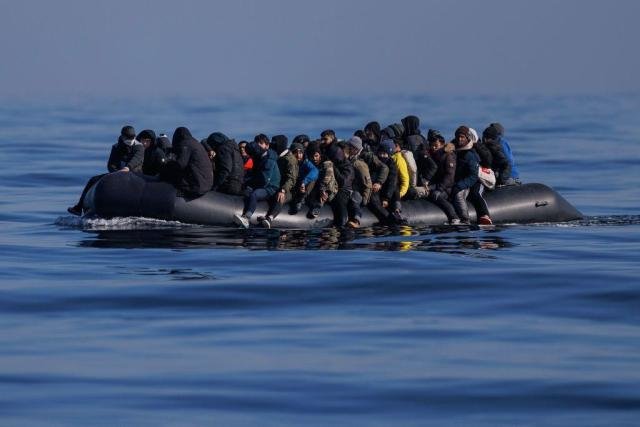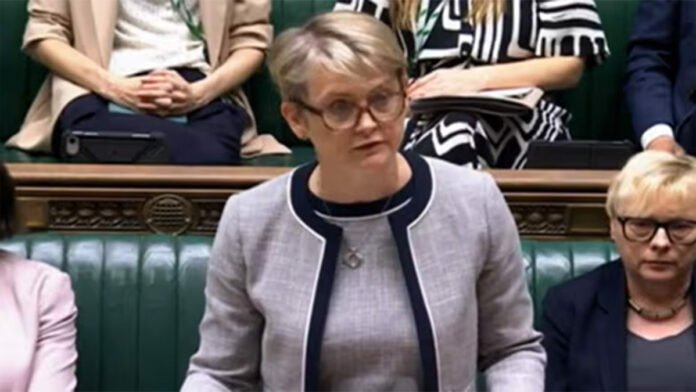The Tragicomic Farce of the Tories’ Rwanda Deportation Plan
If the world is a stage then in the grand theatre of political absurdity, few productions have matched the tragicomic farce of the Tories’ Rwanda scheme. This wasteful and morally bankrupt as the Tories’ ill-fated Rwanda deportation plan. Like a demented gambler throwing good money after bad, the Conservative Party has managed to fritter away a staggering £700 million of taxpayers’ hard-earned cash on this cruel and unworkable fantasy.
Let us pause for a moment to consider the sheer scale of this profligacy. Seven hundred million pounds sterling, enough to fund thousands of nurses or teachers, squandered on a scheme that has succeeded in removing precisely four individuals from our shores. We are reminded of Oscar Wilde’s quip about knowing “the price of everything and the value of nothing” – though in this case, it seems the Tories know neither.
The shadow of this debacle now looms large over the political landscape, with Home Secretary Yvette Cooper laying bare the grim arithmetic of Conservative incompetence. It is a tale of chartered flights that never took off, of civil servants toiling fruitlessly, of detainees held and then released at great expense. All this, mind you, for a policy that was always more about appeasing the rabid right-wing press than addressing the complex realities of global migration.
The Costs and the Fallout
Ms Cooper’s statement in the Commons revealed the £700 million figure, which includes £290 million of payments to Rwanda, the cost of chartering unused flights, detaining and then releasing hundreds of people, and paying over 1,000 civil servants to work on the scheme. She termed it “the most shocking waste of taxpayers’ money I have ever seen.” The cost is set to get worse, with projections showing the government planned to spend more than £10 billion over six years.
Despite the staggering waste, Foreign Secretary James Cleverly dismissed Cooper’s criticism as “hyperbole” and “made up numbers,” accusing Labour of scrapping the scheme on “ideological grounds.” Yet, the facts remain stark: the scheme has been an enormous financial drain with little to show for it.
Ms Cooper said the government would change the law so the Home Office could “immediately start clearing cases from after March 2023”, estimating this would save the taxpayer around £7bn over the next 10 years.
However, Mr Cleverly said it was Labour which was giving an effective “amnesty”, by sending the message that “if you arrive by small boat, you can claim asylum”.
Ms Cooper warned that high levels of small boat crossings were likely to persist over the summer.
So far this year, more than 15,000 people have crossed the Channel in small boats.
The figure is higher than numbers for the same period in the previous four years, although in 2023 as a whole there was a drop compared to 2022.
The Rwanda scheme is politics at its most cynical – a calculated attempt to weaponise human misery for electoral gain, it failed dramatically.

As the estimable Tony Benn once observed, “The way a government treats refugees is very instructive because it shows you how they would treat the rest of us if they thought they could get away with it.” In this light, the Rwanda scheme stands as a damning indictment of Tory rule – a testament to their willingness to sacrifice both human dignity and fiscal responsibility on the altar of xenophobic posturing.
The new government’s decision to scrap this expensive gimmick is welcome. Yet we must not lose sight of the broader malaise it represents. The very conception of such a scheme speaks volumes about the moral rot at the heart of our political establishment. It stands as a stark reminder of the urgent need to reimagine our approach to asylum and immigration from the ground up.
The challenge now is to craft a policy that is both compassionate and pragmatic, one that recognises our moral obligations while addressing legitimate concerns about border security and social cohesion. This will require political courage, clear-eyed analysis, and a willingness to engage with the complexities of the issue rather than resorting to the sloganeering and scapegoating that has characterised the debate thus far.

In scrapping the Rwanda scheme, the government has taken a necessary first step. But it is only that – a first step on a long and treacherous path. The true challenge lies not in patching up our broken system, but in confronting the grotesque inequalities that fuel global migration.
Let us not mince words: we live in a world where the accident of birth determines whether one dines on caviar or scrounges for scraps. The stark reality – one that should shake us to our very core – is that those of us reading this are likely part of the global 1%. This isn’t about billionaires or the jet-setting elite; it’s about us, the average income earners in developed nations. With a mere £28,000 annual income, that puts you in the 1%, this so-called global elite, while 3.9 billion souls subsist on less than £5.50 per day. It’s a disparity that lays bare the obscene imbalance of our world order.
The 1% isn’t a billionaires club.
99% of the world makes less than £28,000 a year—
exceed that, and you’re part of that privileged one percent.
The root causes of migration – war, poverty, climate catastrophe – are not acts of God, but the predictable outcomes of a system designed to funnel wealth upwards. If we truly wish to address migration, we must first address this fundamental imbalance. Building schools instead of bomb shelters, investing in sustainable development and infrastructure rather than arms races – these are the radical yet necessary steps we must take, building not bombing- now there’s a slogan you can take to the bank.
But let us not be naive. The powers that be have a vested interest in maintaining this status quo. They would have us believe that those crossing our borders should be content with their lot, the question is if you had their lot would you be?
Until we tackle this fundamental imbalance, no amount of deterrence or border control will stem the tide of human movement. The walls we build, physical or legislative, will always be scaled by those seeking a safer life, a better life for themselves and their children.
The Rwanda scheme’s demise offers us a chance to reset our moral compass, to craft policies that reflect the best of British values rather than pandering to our basest instincts. Let us seize this opportunity, lest we find ourselves, in years to come, looking back on this moment as yet another missed chance to build a fairer, more just society.
The alternative – a continuation of the cruel and wasteful policies of the past – is not merely unthinkable. It is a moral abomination, a stain upon our collective conscience that no amount of political sophistry can erase. We stand at a crossroads. The path ahead is arduous, but it is the only one worthy of a nation that dares to call itself civilised.
In the end, how we treat the most vulnerable among us defines who we are as a nation. And on that score, the Tories’ Rwanda folly has left us sorely wanting.
You want to stop the crossings? Then tackle the root causes, don’t just mistreat the symptoms. It’s high time we confronted the real issues driving global migration, rather than wasting billions on cruel and ineffective deterrents. Only by addressing the fundamental inequalities that plague our world can we hope to create a just and humane solution to this crisis. Anything less is not merely inadequate – it’s an abdication of our moral responsibility.
Support Independent Journalism Today
Our unwavering dedication is to provide you with unbiased news, diverse perspectives, and insightful opinions. We're on a mission to ensure that those in positions of power are held accountable for their actions, but we can't do it alone. Labour Heartlands is primarily funded by me, Paul Knaggs, and by the generous contributions of readers like you. Your donations keep us going and help us uphold the principles of independent journalism. Join us in our quest for truth, transparency, and accountability – donate today and be a part of our mission!
Like everyone else, we're facing challenges, and we need your help to stay online and continue providing crucial journalism. Every contribution, no matter how small, goes a long way in helping us thrive. By becoming one of our donors, you become a vital part of our mission to uncover the truth and uphold the values of democracy.
While we maintain our independence from political affiliations, we stand united against corruption, injustice, and the erosion of free speech, truth, and democracy. We believe in the power of accurate information in a democracy, and we consider facts non-negotiable.
Your support, no matter the amount, can make a significant impact. Together, we can make a difference and continue our journey toward a more informed and just society.
Thank you for supporting Labour Heartlands












